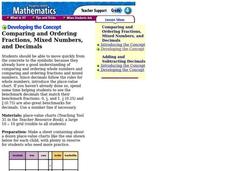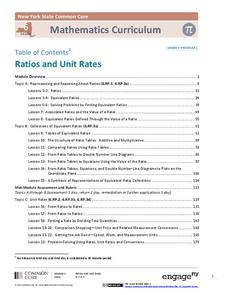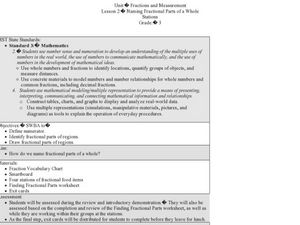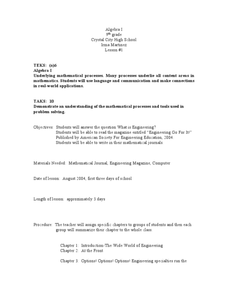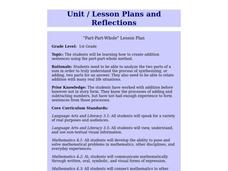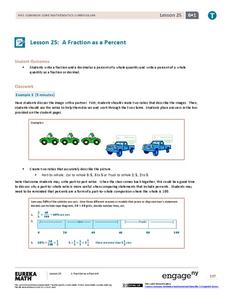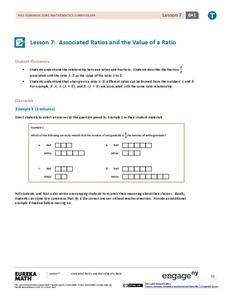Curated OER
Comparing and Ordering Fractions, Mixed Numbers, and Decimals
Young scholars practice comparing and ordering fractions, mixed numbers, and decimals. In this fractions, mixed numbers, and decimals instructional activity, students examine a decimal place value chart compared to a whole number place...
Curated OER
Fractions: Thirds and Fifths
Show the class the differences between thirds and fifths. Each slide provides visual information describing what the part whole relationship is for fractions involving thirds and fifths. The last slide encouages learners to identify...
Math Mammoth
Recognize Fractions
In this fractions activity, students use the shaded figures and write fractions based on the shaded area to the whole area. Students also learn how to draw pie models. Students divide the circle into fractions and color the right amount...
Curated OER
Fractions lesson 1
Students are given an overview of fractions using fractions manipulatives. Students comprehend what numerators and denominators are. They demonstrate a clear comprehension that the size of a fraction depends on the number of parts the...
Curated OER
Part Part Whole
First graders solve number sentences. In this problem solving activity, 1st graders construct addition sentences using a part part whole mat. Students demonstrate problem solving strategies using cubes.
Curated OER
Understanding Fractions
In this recognizing fractions worksheet, students observe explanations and examples of pie charts and bars and use them to color, write the fraction of the shaded part, and draw and color pie charts. They will solve thirty-two problems.
EngageNY
Ratios and Unit Rates
This turn-key unit on ratios and unit rates walks through a 30-lesson unit on teaching proportional reasoning, with each lesson broken into detailed teaching notes and time allotments for all parts. An unbelievable resource when taken...
Curated OER
One Whole and Its Fractional Parts
In this discovering fractions worksheet, students read explanations with examples of fractional parts and mixed numbers and use them to create fractions. Students write four answers.
Curated OER
Part of a Whole Group
In these two recognizing fractions worksheets, students review examples, observe boxes with two different kinds of things, and use them to write each part as fractions. Next, they circle items to make groups to use to complete number...
Curated OER
Naming Fractional Parts of a Whole
Third graders complete a worksheet. In this fractions lesson, 3rd graders review fraction vocabulary, use the SmartBoard to divide fractions and complete stations where they work with fractional parts of a whole.
Curated OER
7th Grade Math Circle Graphs
Seventh graders are able to develop (synthesis) pie graphs with the class and on their own. They are told that pie charts are a graphic representation of material that can be given in the form of parts of a whole by using...
Curated OER
The Summer School Math Worksheets-Multiplication, Division, Fractions Level 5
In this summer school math worksheet, students complete 100 multiplication problems in which 3 digit numbers are multiplied by 2 digit numbers. Kids also solve 100 problems in which simple fractions with unlike denominators are added and...
Curated OER
Problem Solving Using Math
Students solve real life scenarios using algebra. In this word problem lesson plan, students use different websites dealing with engineering as it relates to the real world and math. They use other resources such as magazines to solve...
Curated OER
Part-Part-Whole
First graders work with partners, using cubes to make addition sentences. In this math lesson, 1st graders separate cubes into 2 parts and discuss the relationship to addition sentences. Students practice separating cubes. Students make...
Curated OER
Introduction to Equivalent Fractions
Explore equivalent fractions! Youngters measure the crown of their head with adding tape labeled with various fractions and fractional parts, and compare strips to notice numerical relationships. They fold adding tape in half and color...
Illustrative Mathematics
Make 9
Learning how numbers are put together as parts and wholes is a big step in building the foundational number sense of young mathematicians. Here, children are given a number less than 10 and are asked to find as many pairs of numbers as...
EngageNY
A Fraction as a Percent
It is all about being equivalent. Class members convert between fractions, decimals, and percents. By using visual models, scholars verify their conversions in the 25th portion of a 29-part series.
DK Publishing
Part of a Whole
Use segmented shapes to introduce scholars to fractions before they even have learned about numerators and denominators (although this is a great way to introduce these terms!). The first section has four multiple-choice problems:...
Curated OER
Parts of a Set
Calling all fraction novices! Use sets of objects to introduce scholars to fractions before they even have learned about numerators and denominators (but this is a great way to introduce these terms!). The first section has four...
EngageNY
Associated Ratios and the Value of a Ratio
Do ratios have values? The seventh lesson in a series of 29 introduces the value of a ratio. Pupils create associated ratios to a given ratio. They also describe the fraction associated to the ratio as the value of the ratio.
Curated OER
Division by Fractions (Part Two)
Investigate division through the use of array models. The lesson focuses on using area models to compare division as sharing with division as grouping. Students evaluate the usefulness and limitations of the two array models.
Province of Nova Scotia
Fraction Strips
How can you tell how many thirds are in a whole? Or twelfths? Use a fraction strips worksheet to visualize how many parts are in one whole.
Los Angeles County Office of Education
Assessment for the California Mathematics Standards Grade 3
Assess scholars' knowledge with a 22-page assessment that covers place value, patterns, probability, estimation, measurement, geometric figures; and their ability to add, subtract, multiply and divide proficiently.
EngageNY
Margin of Error When Estimating a Population Proportion (part 1)
Use the power of mathematics to find the number of red chips in a bag — it's a little like magic! The activity asks learners to collect data to determine the percentage of red chips in a bag. They calculate the margin of error and...
